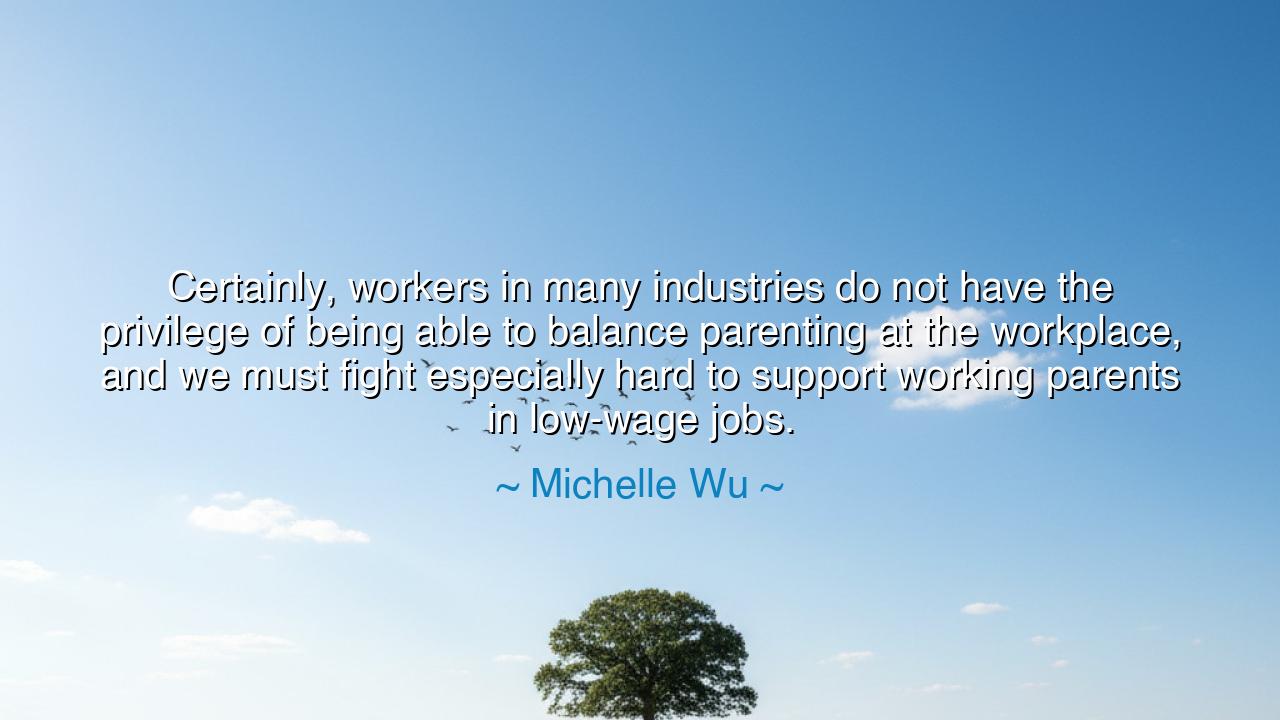
Certainly, workers in many industries do not have the privilege
Certainly, workers in many industries do not have the privilege of being able to balance parenting at the workplace, and we must fight especially hard to support working parents in low-wage jobs.






Hearken, O children of generations yet to rise, and attend to the resolute words of Michelle Wu, whose voice calls forth the urgent cry of justice: “Certainly, workers in many industries do not have the privilege of being able to balance parenting at the workplace, and we must fight especially hard to support working parents in low-wage jobs.” In these words lies a profound recognition of the burdens borne by the many, whose labor sustains society yet whose families often endure hardship and neglect. Wu reminds us that the path to equity and compassion demands action, courage, and advocacy, for the well-being of children and the dignity of workers are intertwined.
The origin of this reflection lies in Wu’s life as a leader and observer of society, attuned to the struggles of the working class. In industries where wages are meager and hours unyielding, parents must toil while juggling responsibilities that demand time, attention, and care. Her words echo the ancient truth that a society is judged not by the privileges of the few, but by the protection, support, and justice extended to its most vulnerable. She calls upon all who cherish morality and fairness to lift the burdens that weigh upon those whose labor is essential yet undervalued.
The meaning of her statement is both practical and moral. To recognize that some workers lack the privilege of balance is to confront inequality directly. It is not merely a question of individual choice, but of societal structure: wages, working hours, and workplace policies either empower or oppress, either enable nurturing or enforce sacrifice. Wu exhorts us to fight for policies, protections, and cultural shifts that allow every parent—regardless of station—to fulfill both their roles as laborer and nurturer without being crushed by circumstance.
Consider the historical struggle of the textile workers in 19th century England, many of whom were women forced to labor long hours while caring for infants and young children. Their toil enriched factory owners and the nation, yet left families deprived of care, stability, and attention. It was the advocacy of reformers—champions of child labor laws, fair wages, and humane working conditions—that gradually restored dignity, enabling parents to nurture without being exploited. Wu’s words echo this enduring struggle: justice requires vigilance and action, especially for those most imperiled.
Her reflection also carries a call to moral courage and collective responsibility. To support working parents in low-wage jobs is to honor not only their labor, but the continuity of family, community, and society itself. It is a recognition that nurturing children, teaching values, and sustaining households are as vital to civilization as the labor that produces wealth and goods. The fight Wu invokes is both structural and spiritual: it is a struggle for the well-being, dignity, and humanity of all.
The lesson for future generations is luminous: justice is measured by the care given to the vulnerable, the strength of those who lift the burdens of the disadvantaged, and the foresight to construct systems that allow families to thrive. In supporting working parents, society secures the health, education, and virtue of its children, planting seeds whose harvest sustains generations yet unborn. Compassion and action are inseparable; one cannot exist without the other.
In practical life, one may follow Wu’s counsel by advocating for fair wages, parental leave, childcare support, and flexible policies that protect and empower working parents. Observe, listen, and act to alleviate the pressures borne by those who toil without recognition. Support initiatives that recognize the sacred duty of parenting as inseparable from the demands of labor. Encourage community, workplace reform, and legislation that honors the dual roles of parent and worker.
Thus, O children of future ages, carry this teaching as both shield and clarion: the strength of a society is measured by how it nurtures its working parents and their children. Fight for justice, act with compassion, and build structures that support labor and nurture alike. In this, the world endures, communities flourish, and the generations that follow inherit a legacy of equity, dignity, and care, a testament to the enduring power of human conscience and collective responsibility.






AAdministratorAdministrator
Welcome, honored guests. Please leave a comment, we will respond soon